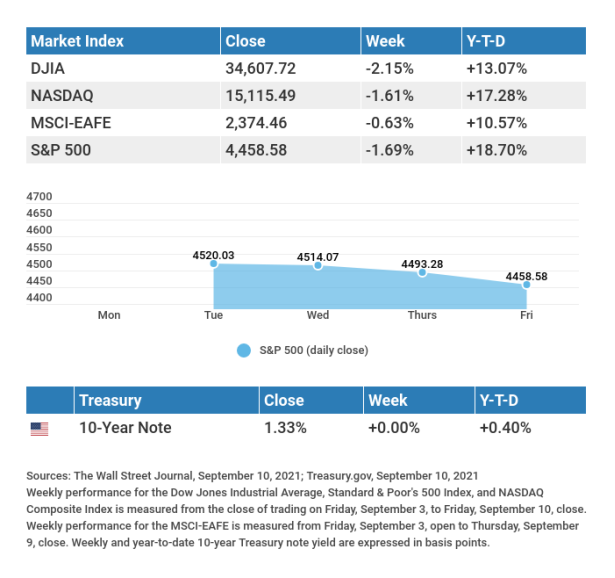THE WEEK ON WALL STREET
In a quiet week of news, stocks moved lower amid simmering concerns over the Delta variant’s effect on the progress of economic reopening.
The Dow Jones Industrial Average declined 2.15%, while the Standard & Poor’s 500 dropped 1.69%. The Nasdaq Composite index fell 1.61% for the week. The MSCI EAFE index, which tracks developed overseas stock markets, slipped 0.63%.1,2,3
STOCKS WEAKEN
In a holiday-shortened week of trading, markets were choppy as investors grew cautious in the face of a potential Fed tapering decision later this month and the impact of Delta on the economic recovery.
What little news there was, it was decidedly mixed. Job growth showed real strength coming off a shaky employment report the previous Friday, while the Producer Price Index surged by 8.3% year-over-year, representing the largest annual increase since November 2010. The release reminded investors that inflation remained a market risk. Stocks tried to stage a rebound on Friday before sagging to close out the week.
JOBS IMPROVEMENT
After a disappointing employment report, two labor market reports last week appeared to show that the labor market recovery appeared intact. The JOLTS report (Job Openings and Labor Turnover Survey) showed 10.9 million open jobs, a number that exceeded the number of unemployed by more than two million. The rate of hiring, however, decelerated, perhaps explaining why the August employment report fell short of expectations.4
A day later the weekly initial jobless claims fell to a new pandemic low of 310,000, coming in below its four-week moving average of 339,500. Continuing claims fell to their lowest level since March 14, 2020.5
THE WEEK ON WALL STREET
In a quiet week of news, stocks moved lower amid simmering concerns over the Delta variant’s effect on the progress of economic reopening.
The Dow Jones Industrial Average declined 2.15%, while the Standard & Poor’s 500 dropped 1.69%. The Nasdaq Composite index fell 1.61% for the week. The MSCI EAFE index, which tracks developed overseas stock markets, slipped 0.63%.1,2,3
STOCKS WEAKEN
In a holiday-shortened week of trading, markets were choppy as investors grew cautious in the face of a potential Fed tapering decision later this month and the impact of Delta on the economic recovery.
What little news there was, it was decidedly mixed. Job growth showed real strength coming off a shaky employment report the previous Friday, while the Producer Price Index surged by 8.3% year-over-year, representing the largest annual increase since November 2010. The release reminded investors that inflation remained a market risk. Stocks tried to stage a rebound on Friday before sagging to close out the week.
JOBS IMPROVEMENT
After a disappointing employment report, two labor market reports last week appeared to show that the labor market recovery appeared intact. The JOLTS report (Job Openings and Labor Turnover Survey) showed 10.9 million open jobs, a number that exceeded the number of unemployed by more than two million. The rate of hiring, however, decelerated, perhaps explaining why the August employment report fell short of expectations.4
A day later the weekly initial jobless claims fell to a new pandemic low of 310,000, coming in below its four-week moving average of 339,500. Continuing claims fell to their lowest level since March 14, 2020.5
THE WEEK ON WALL STREET
In a quiet week of news, stocks moved lower amid simmering concerns over the Delta variant’s effect on the progress of economic reopening.
The Dow Jones Industrial Average declined 2.15%, while the Standard & Poor’s 500 dropped 1.69%. The Nasdaq Composite index fell 1.61% for the week. The MSCI EAFE index, which tracks developed overseas stock markets, slipped 0.63%.1,2,3
STOCKS WEAKEN
In a holiday-shortened week of trading, markets were choppy as investors grew cautious in the face of a potential Fed tapering decision later this month and the impact of Delta on the economic recovery.
What little news there was, it was decidedly mixed. Job growth showed real strength coming off a shaky employment report the previous Friday, while the Producer Price Index surged by 8.3% year-over-year, representing the largest annual increase since November 2010. The release reminded investors that inflation remained a market risk. Stocks tried to stage a rebound on Friday before sagging to close out the week.
JOBS IMPROVEMENT
After a disappointing employment report, two labor market reports last week appeared to show that the labor market recovery appeared intact. The JOLTS report (Job Openings and Labor Turnover Survey) showed 10.9 million open jobs, a number that exceeded the number of unemployed by more than two million. The rate of hiring, however, decelerated, perhaps explaining why the August employment report fell short of expectations.4
A day later the weekly initial jobless claims fell to a new pandemic low of 310,000, coming in below its four-week moving average of 339,500. Continuing claims fell to their lowest level since March 14, 2020.5
Your will, trust, and powers of attorney should be reviewed regularly, once a year if possible. Time can alter priorities and intentions.
THE WEEK AHEAD: KEY ECONOMIC DATA
Tuesday: Consumer Price Index.
Wednesday: Industrial Production.
Thursday: Jobless Claims. Retail Sales.
Friday: Consumer Sentiment.
Source: Econoday, September 10, 2021
The Econoday economic calendar lists upcoming U.S. economic data releases (including key economic indicators), Federal Reserve policy meetings, and speaking engagements of Federal Reserve officials. The content is developed from sources believed to be providing accurate information. The forecasts or forward-looking statements are based on assumptions and may not materialize. The forecasts also are subject to revision.
THE WEEK AHEAD: COMPANIES REPORTING EARNINGS
Monday: Lennar Corporation (LEN).
Source: Zacks, September 10, 2021
Companies mentioned are for informational purposes only. It should not be considered a solicitation for the purchase or sale of the securities. Investing involves risks, and investment decisions should be based on your own goals, time horizon, and tolerance for risk. The return and principal value of investments will fluctuate as market conditions change. When sold, investments may be worth more or less than their original cost. Companies may reschedule when they report earnings without notice.
“Pleasure in the job puts perfection in the work.”
ARISTOTLE

You can easily touch me, but not see me. You can throw me out, but not away. What am I?
LAST WEEK’S RIDDLE: I can only live where there is light, but I die if the light shines on me. What am I?
ANSWER: A shadow
Take Point Wealth may be reached at:
Investing involves risks, and investment decisions should be based on your own goals, time horizon, and tolerance for risk. The return and principal value of investments will fluctuate as market conditions change. When sold, investments may be worth more or less than their original cost.
The forecasts or forward-looking statements are based on assumptions, may not materialize, and are subject to revision without notice.
The market indexes discussed are unmanaged, and generally, considered representative of their respective markets. Index performance is not indicative of the past performance of a particular investment. Indexes do not incur management fees, costs, and expenses. Individuals cannot directly invest in unmanaged indexes. Past performance does not guarantee future results.
The Dow Jones Industrial Average is an unmanaged index that is generally considered representative of large-capitalization companies on the U.S. stock market. Nasdaq Composite is an index of the common stocks and similar securities listed on the NASDAQ stock market and is considered a broad indicator of the performance of technology and growth companies. The MSCI EAFE Index was created by Morgan Stanley Capital International (MSCI) and serves as a benchmark of the performance of major international equity markets, as represented by 21 major MSCI indexes from Europe, Australia, and Southeast Asia. The S&P 500 Composite Index is an unmanaged group of securities that are considered to be representative of the stock market in general.
U.S. Treasury Notes are guaranteed by the federal government as to the timely payment of principal and interest. However, if you sell a Treasury Note prior to maturity, it may be worth more or less than the original price paid. Fixed income investments are subject to various risks including changes in interest rates, credit quality, inflation risk, market valuations, prepayments, corporate events, tax ramifications and other factors.
International investments carry additional risks, which include differences in financial reporting standards, currency exchange rates, political risks unique to a specific country, foreign taxes and regulations, and the potential for illiquid markets. These factors may result in greater share price volatility.
Please consult your financial professional for additional information.
This content is developed from sources believed to be providing accurate information. The information in this material is not intended as tax or legal advice. Please consult legal or tax professionals for specific information regarding your individual situation. This material was developed and produced by FMG Suite to provide information on a topic that may be of interest. FMG is not affiliated with the named representative, financial professional, Registered Investment Advisor, Broker-Dealer, nor state- or SEC-registered investment advisory firm. The opinions expressed and material provided are for general information, and they should not be considered a solicitation for the purchase or sale of any security.
Copyright 2021 FMG Suite.
CITATIONS:
- The Wall Street Journal, September 10, 2021
- The Wall Street Journal, September 10, 2021
- The Wall Street Journal, September 10, 2021
- CNBC, September 8, 2021
- CNBC, September 9, 2021





